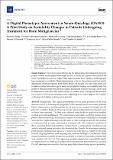| dc.description.abstract | first_pageDownload PDFsettingsOrder Article Reprints
Open AccessArticle
A Digital Phenotypic Assessment in Neuro-Oncology (DANO): A Pilot Study on Sociability Changes in Patients Undergoing Treatment for Brain Malignancies †
by Francesca Siddi 1,2,*,Patrick Emedom-Nnamdi 3,Michael P. Catalino 4,Aakanksha Rana 1,5ORCID,Alessandro Boaro 1,2ORCID,Hassan Y. Dawood 1ORCID,Francesco Sala 2,Jukka-Pekka Onnela 3,‡ andTimothy R. Smith 1,‡
1
Computational Neuroscience Outcomes Center, Department of Neurosurgery, Brigham and Women’s Hospital, and Harvard Medical School, Boston, MA 02115, USA
2
Section of Neurosurgery, Department of Neurosciences, Biomedicine and Movement Sciences, University of Verona, 37129 Verona, Italy
3
Department of Biostatistics, Harvard T.H. Chan School of Public Health, Boston, MA 02115, USA
4
Department of Neurosurgery, University of Virginia, Charlottesville, VA 22908, USA
5
McGovern Institute for Brain Research, Massachusetts Institute of Technology, Cambridge, MA 02139, USA
*
Author to whom correspondence should be addressed.
†
Previous Presentations: This work was virtually presented as an oral poster presentation at the 2021 Annual Meeting of the European Association of Neurosurgical Societies (eEANS), Virtual Congress, 1–7 October 2021; EP13028.
‡
These authors contributed equally to this work.
Cancers 2025, 17(1), 139; https://doi.org/10.3390/cancers17010139
Submission received: 15 October 2024 / Revised: 24 December 2024 / Accepted: 3 January 2025 / Published: 4 January 2025
(This article belongs to the Special Issue Novel Diagnostic and Therapeutic Approaches in Diffuse Gliomas)
Downloadkeyboard_arrow_down Browse Figures Versions Notes
Simple Summary
Nowadays, smartphones are the principal tool for interactions between people. Mobile health applications might be used to study the cognitive functions in the neuro-oncological population. Many brain tumor patients have cognitive challenges that have an impact on sociability. Digital phenotyping is able to characterize social and spatial dimensions of human behavior from mobile phone call records. The aim of this study was to start to explore this technology in brain cancer patients, focusing on sociability data. The results of this pilot study indicate that a digital assessment in neuro-oncology can be used to characterize and follow the social activity of patients’ lives. Changes in the patient’s social network relate to disease progression, suggesting a new tool to improve the complex evaluation of underserved brain cancer patients.
Abstract
Background: The digital phenotyping tool has great potential for the deep characterization of neurological and quality-of-life assessments in brain tumor patients. Phone communication activities (details on call and text use) can provide insight into the patients’ sociability. Methods: We prospectively collected digital-phenotyping data from six brain tumor patients. The data were collected using the Beiwe application installed on their personal smartphones. We constructed several daily sociability features from phone communication logs, including the number of incoming and outgoing text messages and calls, the length of messages and duration of calls, message reciprocity, the number of communication partners, and number of missed calls. We compared variability in these sociability features against those obtained from a control group, matched for age and sex, selected among patients with a herniated disc. Results: In brain tumor patients, phone-based communication appears to deteriorate with time, as evident in the trend for total outgoing minutes, total outgoing calls, and call out-degree. Conclusions: These measures indicate a possible decrease in sociability over time in brain tumor patients that may correlate with survival. This exploratory analysis suggests that a quantifiable digital sociability phenotype exists and is comparable for patients with different survival outcomes. Overall, assessing neurocognitive function using digital phenotyping appears promising. | en_US |
| dc.identifier.citation | Siddi, F.; Emedom-Nnamdi, P.; Catalino, M.P.; Rana, A.; Boaro, A.; Dawood, H.Y.; Sala, F.; Onnela, J.-P.; Smith, T.R. A Digital Phenotypic Assessment in Neuro-Oncology (DANO): A Pilot Study on Sociability Changes in Patients Undergoing Treatment for Brain Malignancies. Cancers 2025, 17, 139. | en_US |
